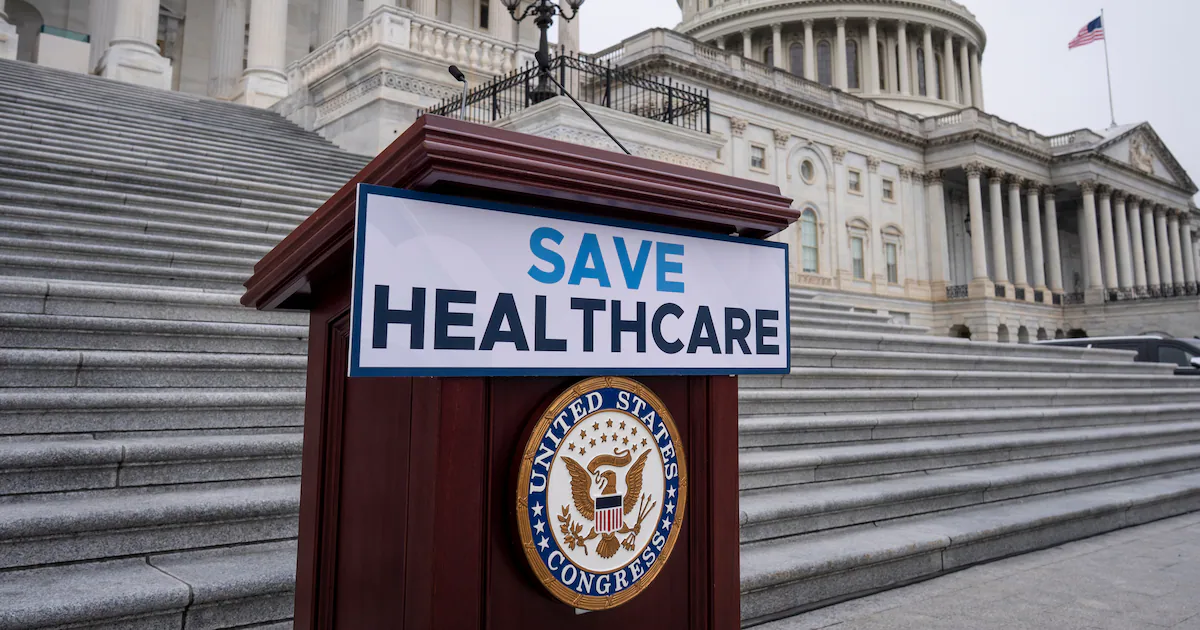
The sticking point at the center of the government shutdown gripping the nation’s capital is a health care premium tax credit.
The subsidies are designed to make coverage under the Affordable Care Act, the sweeping health care legislation commonly known as Obamacare, more affordable for many Americans, and they are set to expire at the end of the year.
Democrats in Congress demand that these credits be extended in any bill reopening the government. They argue the credits must be extended immediately because marketplaces are already making decisions on next year’s rates and will soon inform customers that they will need to spend more for the coverage. Americans receiving those notices may choose, or feel forced, to drop their coverage, according to Democrats.
The five state leaders of health care marketplaces we spoke to agreed, with some pointing out that the open enrollment process – in which Americans can join new plans or change their ACA coverage – starts on Nov. 1.
“This is the last moving vehicle before open enrollment starts in just a few weeks,” said Devon Trolley, the head of Pennsylvania’s exchange.
“We have been raising the need for certainty around an extension with Congress for over a year,” Trolley added. “Vehicle after vehicle has passed where these have not been extended. So … this really is the last chance to do so to avoid coverage disruption.”
Republicans say they are open to extending the credits but only once the government is funded. They argue that extending the credits is not critical at this time because they don’t expire until the end of the year. The Republican funding proposal to reopen the government would keep it open until just before Thanksgiving. Republicans say that is enough time to find a bipartisan path to fund the government for the full fiscal year and leaves plenty of time to debate the credits.
“I think there’s a path forward [on extending ACA subsidies] but it’s going to have to be attached to the appropriations,” Sen. Mike Rounds, a member of the Appropriations Committee, said. “Give us the 45 days. Nothing gets hurt by giving us 45 days.”
Democrats retort that delaying an extension to the subsidies could cause confusion among participants, and the heads of marketplaces we spoke to argue that the communities most affected by a loss of the subsidies are largely older and more rural, two demographics that overwhelmingly backed Trump and Republicans in 2024.
“It’s certainly the case that rural areas where premiums tend to be higher, where folks tend to be older, those are people who are very vulnerable” to higher costs without the tax credits, said Audrey Morse Gasteier, the head of the Massachusetts marketplace.
[Senior government officials privately warn against firings during shutdown]
The credits were established in the law signed by President Barack Obama in 2010. And they were expanded as part of the American Rescue Plan Act, a relief package signed into law by President Joe Biden in response to the economic impact of the coronavirus pandemic.
Allowing these credits to expire would undoubtedly have dramatic effects: A study by the nonpartisan KFF found that those using the premium subsidies would see the cost of their insurance plans increase by 114 percent next year. In dollar terms, KFF calculated that the average customer’s yearly insurance bill could increase from $888 to $1,904 without the credit.
Marketplace leaders attribute the credit to helping expand access to health care nationwide.
“Marketplace enrollment nationally has more than doubled since the enhanced tax credits came to pass,” said Jessica Altman, the head of California’s exchange. “We absolutely, without question, have people who only have coverage because of this affordability.”
“We made it more affordable. People came in, and they saw the value of it during covid, and they want to keep it,” said Kevin Patterson, the head of Colorado’s marketplace.
The program is not cheap. The Congressional Budget Office estimated this year that extending the subsidies permanently would increase the budget deficit by $335 billion over the next decade; however, doing so would also result in 3.4 million more people having health insurance each year during the same period.
“We are not going to do that, we can’t do that, we won’t do that,” House Speaker Mike Johnson said during an event on Wednesday, speaking about approving that kind of spending to reopen the government. He said Democrats should abandon their calls to tie the subsidies to government funding: “The longer this goes on, the more pain will be inflicted because it is inevitable when the government shuts down.”
But there is an obvious lack of trust at play here. Sen. Patty Murray, a Washington Democrat, questioned Republicans’ commitment to an extension, arguing that if Trump “says don’t,” Republicans won’t, even if they had already promised to do so.
“We are open to a discussion on how to get this so that we can get it done in time for it to make a difference for people who are going to see these exorbitant costs,” Murray said.
[With the Senate’s center hollowed out, a long shutdown could be at hand]
The politics of this are compelling. Conservatives argue that the subsidies enable insurance companies to maintain artificially high prices. The conservative American Legislative Exchange Council recently wrote that the subsidies “distort the health insurance market by driving up premiums” and that extending them “would pour gasoline on this fire.”
However, several Republican lawmakers who represent districts or states with high ACA enrollment have expressed concern about sunsetting the subsidies. Numerous Senate Republicans, including Majority Leader John Thune, said they would be open to eventually negotiating a way to keep the subsidies – again, just not under the rushed pressure of a shutdown.
Here is the blunt takeaway: The ACA credits remain a sticking point, and you shouldn’t expect a resolution Thursday.
The House is on recess until early next week. The Senate is in session but has no votes scheduled until Friday.
Several Senate Democrats huddled with their Republican peers on the Senate floor Wednesday to find a way out of the shutdown in preliminary, informal talks. But Senate Republicans need five more Democratic votes – assuming the two Democrats and one independent who voted with Republicans on their funding measure Wednesday continue to do so – to end the shutdown.



